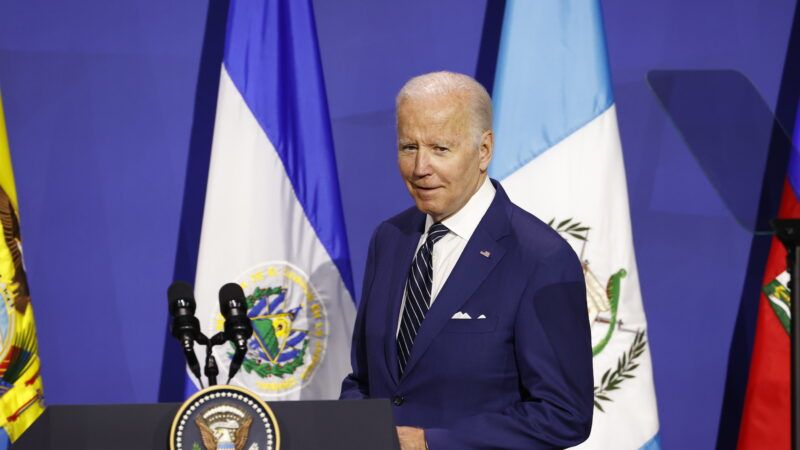Biden's Summit of the Americas Was Over Before It Started
Biden's decision to exclude nondemocratic countries led to a boycott by allies.

In a speech delivered last Wednesday at the Ninth Summit of the Americas in Los Angeles, President Joe Biden made a passionate plea for renewed purpose and partnership between the United States and its Latin American and Caribbean neighbors.
But it was some conspicuously empty seats in the audience that grabbed the attention. Out of the 35 countries in the Americas, only 23 sent heads of state, one of the lowest attendance rates since the first summit almost 30 years ago.
Most of these absences stem from Biden's decision to not invite Cuba, Nicaragua, and Venezuela to the summit over their human rights records, a move driven in part by pressure from Cuban-American exile groups. "There can't be a Summit of the Americas if all the countries of the continent don't participate," Mexican President Andres Manuel Lopez Obrador stated at a press conference on June 6. The presidents of El Salvador, Guatemala, and Honduras, major sources of migration to the United States, also announced they would not attend in protest.
In 2001, the Organization of American States passed the Inter-American Democratic Charter, officially barring nondemocratic states from participating in successive summits at the behest of the United States. However, this rule was seemingly annulled when the U.S. and Cuba reestablished diplomatic relations under former President Barack Obama.
Cuba attended the 2015 summit in Panama, where Obama's meeting with former Cuban President Raul Castro marked the first time Cuban and American heads of state had met since the Cuban Revolution. "After 50 years of policy that had not changed on the part of the United States, it was my belief that it was time to try something new," Obama said at the time. "I think we are now in a position to move on a path towards the future, and leave behind some of the circumstances of the past that have made it so difficult, I think, for our countries to communicate."
Many assumed the Biden administration would have honored that commitment in order to maintain American geopolitical influence in the hemisphere. "We thought we had gotten over this and moved beyond this in Cartagena," says Angelo Rivero Santos, a professor at Georgetown University who previously served as Venezuela's acting ambassador to the United States. It was at the Sixth Summit of the Americas in Cartagena, Colombia, in 2012, where the U.S. faced intense pressure from other countries in the region to include Cuba in future summits.
Rivero Santos expressed concerns that the Biden administration was returning to a destructive precedent for hemispheric relations. "We seem to be back in this era where a host country like the United States can pick and choose who comes based on its own criteria."
Critics of Biden's decision have not only chafed at the U.S. unilaterally defining a region that spans two continents but also disapproved of Biden's plan to visit Saudi Arabia in July, despite his having roundly condemned the Gulf nation for its role in the torture and murder of Washington Post columnist Jamal Khashoggi in 2018. "Geography, not politics, defines the Americas," said Belize Prime Minister John Briceño in a testy exchange with Biden at the summit.
The no-shows overshadowed many of the White House's policy announcements on Latin America, including a climate pact with Caribbean nations, a framework for regional economic collaboration, and new action plans for addressing the migration crisis.
"One way to measure the success of diplomatic summits is by how many heads [of state] show up," says Jorge Heine, a professor at Boston University who served as Chile's ambassador to China. "It's not looking good for the state of [U.S./Latin American] international relations."
Even as the Biden administration tries to salvage its feted Los Angeles Declaration, which sets common priorities and mechanisms for combating the migration crisis, the absences have member states doubting that any real improvements can be made.
"There is no way President Biden can make progress on addressing the migrant crisis since the Presidents of Mexico, Guatemala, Honduras, and El Salvador chose not to attend," said Rep. Maria Elvira Salazar (R–Fla.), a key Republican voice on U.S foreign policy in Latin America and immigration reform, in a statement to Reason. "Disorganization, poor planning, and zero focus on real economic development doomed the Summit before it even started."
The summit's perceived disconnects have confirmed what some in the region have feared: The U.S. is failing to reset or even update its Latin America policy after years of neglect under former President Donald Trump.
"Expectations in Latin America when President Biden took office were high, especially in terms of the opportunities it would offer the region," Heine says. However, in Heine's view, the Biden administration has mostly adopted a "Trump-lite" approach to engagement with Latin America, especially when it pertains to immigration and policy toward Cuba and Venezuela. "The rhetoric is different, but in terms of policy, it's much the same."
"Washington seems to have prepared this summit as if it was 1994," said Rivero Santos, referring back to the first Summit of the Americas held in Miami. Rivero Santos believes the Biden administration still sees the Americas through the prism of the 1990s neoliberal political wave that swept south, but socialist and populist governments have been making inroads in the region for years. "Washington has not been able to keep up with the changes in the region. The Latin America of 1994 is very different than the Latin America of 2022."
"It makes you scratch your head and wonder: Why are they trapped in this policy?"


Show Comments (26)